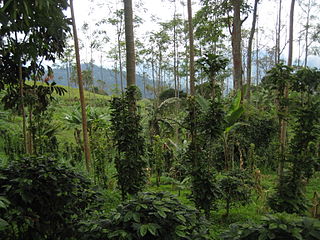
Agriculture encompasses crop and livestock production, aquaculture, fisheries, and forestry for food and non-food products. Agriculture was the key development in the rise of sedentary human civilization, whereby farming of domesticated species created food surpluses that enabled people to live in cities. While humans started gathering grains at least 105,000 years ago, nascent farmers only began planting them around 11,500 years ago. Sheep, goats, pigs, and cattle were domesticated around 10,000 years ago. Plants were independently cultivated in at least 11 regions of the world. In the 20th century, industrial agriculture based on large-scale monocultures came to dominate agricultural output.
The following outline is provided as an overview of and topical guide to agriculture:

Agronomy is the science and technology of producing and using plants by agriculture for food, fuel, fiber, chemicals, recreation, or land conservation. Agronomy has come to include research of plant genetics, plant physiology, meteorology, and soil science. It is the application of a combination of sciences such as biology, chemistry, economics, ecology, earth science, and genetics. Professionals of agronomy are termed agronomists.
The following outline is provided as an overview of and topical guide to sustainable agriculture:

Sustainable agriculture is farming in sustainable ways meeting society's present food and textile needs, without compromising the ability for current or future generations to meet their needs. It can be based on an understanding of ecosystem services. There are many methods to increase the sustainability of agriculture. When developing agriculture within sustainable food systems, it is important to develop flexible business processes and farming practices. Agriculture has an enormous environmental footprint, playing a significant role in causing climate change, water scarcity, water pollution, land degradation, deforestation and other processes; it is simultaneously causing environmental changes and being impacted by these changes. Sustainable agriculture consists of environment friendly methods of farming that allow the production of crops or livestock without causing damage to human or natural systems. It involves preventing adverse effects on soil, water, biodiversity, and surrounding or downstream resources, as well as to those working or living on the farm or in neighboring areas. Elements of sustainable agriculture can include permaculture, agroforestry, mixed farming, multiple cropping, and crop rotation.
Agroecology is an academic discipline that studies ecological processes applied to agricultural production systems. Bringing ecological principles to bear can suggest new management approaches in agroecosystems. The term can refer to a science, a movement, or an agricultural practice. Agroecologists study a variety of agroecosystems. The field of agroecology is not associated with any one particular method of farming, whether it be organic, regenerative, integrated, or industrial, intensive or extensive, although some use the name specifically for alternative agriculture.

Food sovereignty is a food system in which the people who produce, distribute, and consume food also control the mechanisms and policies of food production and distribution. This stands in contrast to the present corporate food regime, in which corporations and market institutions control the global food system. Food sovereignty emphasizes local food economies, sustainable food availability, and centers culturally appropriate foods and practices. Changing climates and disrupted foodways disproportionately impact indigenous populations and their access to traditional food sources while contributing to higher rates of certain diseases; for this reason, food sovereignty centers indigenous peoples. These needs have been addressed in recent years by several international organizations, including the United Nations, with several countries adopting food sovereignty policies into law. Critics of food sovereignty activism believe that the system is founded on inaccurate baseline assumptions; disregards the origins of the targeted problems; and is plagued by a lack of consensus for proposed solutions.
Biodynamic agriculture is a form of alternative agriculture based on pseudo-scientific and esoteric concepts initially developed in 1924 by Rudolf Steiner (1861–1925). It was the first of the organic farming movements. It treats soil fertility, plant growth, and livestock care as ecologically interrelated tasks, emphasizing spiritual and mystical perspectives.

Urban agriculture refers to various practices of cultivating, processing, and distributing food in urban areas. The term also applies to the area activities of animal husbandry, aquaculture, beekeeping, and horticulture in an urban context. Urban agriculture is distinguished from peri-urban agriculture, which takes place in rural areas at the edge of suburbs.

Mikhail Mikhailovich Bakhtin was a Russian philosopher, literary critic and scholar who worked on literary theory, ethics, and the philosophy of language. His writings, on a variety of subjects, inspired scholars working in a number of different traditions and in disciplines as diverse as literary criticism, history, philosophy, sociology, anthropology and psychology. Although Bakhtin was active in the debates on aesthetics and literature that took place in the Soviet Union in the 1920s, his distinctive position did not become well known until he was rediscovered by Russian scholars in the 1960s.
In literary theory and philosophy of language, the chronotope is how configurations of time and space are represented in language and discourse. The term was taken up by Russian literary scholar Mikhail Bakhtin who used it as a central element in his theory of meaning in language and literature. The term itself comes from the Russian xронотоп, which in turn is derived from the Greek χρόνος ('time') and τόπος ('space'); it thus can be literally translated as "time-space." Bakhtin developed the term in his 1937 essay "Forms of Time and of the Chronotope in the Novel". Here Bakhtin showed how different literary genres operated with different configurations of time and space, which gave each genre its particular narrative character.
Integrated Farming (IF), integrated production or Integrated Farm Management is a whole farm management system which aims to deliver more sustainable agriculture. Integrated Farming combines modern tools and technologies with traditional practices according to a given site and situation, often employing many cultivation techniques in a small growing area.
Civic agriculture is the trend towards locally based agriculture and food production that is tightly linked to a community's social and economic development. It is also connected to the citizenship and environmentalism within a community. Civic agriculture is geared towards meeting consumer demands in addition to boosting the local economy in the process through jobs, farm to food production efforts, and community sustainability. The term was first coined by Thomas Lyson, professor of sociology at Cornell, to represent an alternative means of sustainability for rural agricultural communities in the era of industrialized agriculture. Civic agriculture is geared towards fostering a self sustainable local economy through an integral community structure in which the entire community is in some part responsible for their food production. Civic agriculture can provide a variety of benefits to a community such as cleaner water, fresher foods, and a better connection between farmers and the community. However, there are also critiques that are concerned with the way in which civic agriculture promotes community responsibility and possibly creates a false sense of citizenship. The intent of civic agricultural practices is to move away from the industrialized sector and into a localized community effort.
Agroecosystem analysis is a thorough analysis of an agricultural environment which considers aspects from ecology, sociology, economics, and politics with equal weight. There are many aspects to consider; however, it is literally impossible to account for all of them. This is one of the issues when trying to conduct an analysis of an agricultural environment.

Dialogic learning is learning that takes place through dialogue. It is typically the result of egalitarian dialogue; in other words, the consequence of a dialogue in which different people provide arguments based on validity claims and not on power claims.

Agroecology is an applied science that involves the adaptation of ecological concepts to the structure, performance, and management of sustainable agroecosystems. In Latin America, agroecological practices have a long history and vary between regions but share three main approaches or levels: plot scale, farm scale, and food system scale. Agroecology in Latin American countries can be used as a tool for providing both ecological, economic, and social benefits to the communities that practice it, as well as maintaining high biodiversity and providing refuges for flora and fauna in these countries. Due to its broad scope and versatility, it is often referred to as "a science, a movement, a practice."
Miguel Altieri is a Chilean born agronomist and entomologist. He is a Professor of Agroecology at the University of California, Berkeley in the Department of Environmental Science, Policy and Management.

Natural farming, also referred to as "the Fukuoka Method", "the natural way of farming", or "do-nothing farming", is an ecological farming approach established by Masanobu Fukuoka (1913–2008). Fukuoka, a Japanese farmer and philosopher, introduced the term in his 1975 book The One-Straw Revolution. The title refers not to lack of effort, but to the avoidance of manufactured inputs and equipment. Natural farming is related to fertility farming, organic farming, sustainable agriculture, agroecology, agroforestry, ecoagriculture and permaculture, but should be distinguished from biodynamic agriculture.
Costa Rican agriculture plays a profound part in the country's gross domestic product (GDP). It makes up about 6.5% of Costa Rica's GDP, and 14% of the labor force. Depending upon location and altitude, many regions differ in agricultural crops and techniques. The main exports include: bananas, pineapples, coffee, sugar, rice, vegetables, tropical fruits, ornamental plants, corn, potatoes and palm oil.
A number of movements seek to expand the practice of agroecology in West Africa. Agroecology is a scientific discipline, movement and practice that integrates ecology in agriculture with strong emphasis on diversification, food sovereignty, energy efficiency and sustainability. Agroecological practices apply the systems and knowledge that traditional farmers in the region have developed and inherited. The agroecological social movement empowers smallholder farmers that hold the knowledge of indigenous farming systems, however are recently engulfed by larger farms or are migrating to urban areas, looking for better paying jobs.








